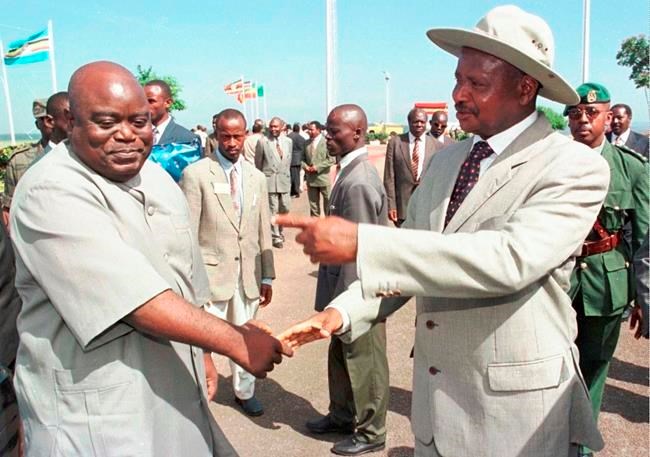THE HAGUE, Netherlands (AP) — The International Court of Justice on Wednesday ordered Uganda to pay $325 million in compensation to Congo for violence in a long-running conflict between the African neighbors that began in the late 1990s.
The compensation order came more than 15 years after the U.N. court ruled in a complex, 119-page judgment that fighting by Ugandan troops in Congo breached international law.
“The court notes that the reparation awarded to the DRC for damage to persons and to property reflects the harm suffered by individuals and communities as a result of Uganda’s breach of its international obligations,” the court's president, U.S. judge Joan E. Donoghue, said.
The sum awarded was well below the request for more than $11 billion in damages Congo had submitted to the court.
The court broke down the compensation into different categories of damages. It assessed $225 million for “loss of life and other damage to persons” that included rape, conscription of child soldiers and the displacement of up to 500,000 people.
It assessed another $40 million for damage to property and $60 million for damage to natural resources, including the plundering of gold, diamonds, timber and other goods by Ugandan forces or rebels they supported.
The case stemmed from years of bloody conflict in Congo’s mineral-rich east. A dispute over land escalated and turned the Ituri region into the epicenter of a regional war in which Congo’s neighbors backed different militias in their battles for influence.
The hostilities also spread west, including to the city of Kisangani, where Donoghue said the fighting was between Ugandan and Rwandan forces.
Donoghue said the International Court of Justice's December 2005 judgment established that "Uganda had committed acts of killing among the civilian population, had failed to distinguish between civilian and military targets, had not protected the civilian population in fighting with other combatants, and as an occupying power, had failed to take measures to respect and ensure respect for human rights and international humanitarian law in entry.”
The 2005 judgment also found that Congolese armed forces violated a treaty on diplomatic relations by attacking the Ugandan Embassy in Kinshasa and abusing Ugandan diplomats at the embassy and at an international airport. Uganda withdrew a compensation claim against Congo linked to those findings.
Congo originally filed the case in 1999 against Uganda, Burundi and Rwanda, calling the African nations' involvement in conflict in Congo a “flagrant breach” of the United Nations charter.
Congo dropped the case against Burundi in 2001, and the world court ruled in 2002 that it did not have jurisdiction in the case against Rwanda.
Under Congolese President Felix Tshisekedi, who was elected in 2019, relations between Uganda and Congo have been warm. The neighboring countries now are security allies, with their armies jointly pursuing rebels in a vast part of eastern Congo.
The current military campaign began in November when Uganda’s army launched air and artillery strikes against the Allied Democratic Forces rebel group.
With Tshisekedi’s authorization, Ugandan troops then entered Congo to hunt down the rebels, who are blamed for multiple deadly attacks on civilians inside Congo as well as a series of bomb attacks in Uganda.
Uganda’s rapprochement with Congo also includes efforts by Uganda’s government to surface more than 200 kilometers of road in eastern Congo. Ugandan authorities believe the investment would open new markets and boost cross-border trade.
___
Associated Press writer Rodney Muhumuza contributed from Kampala, Uganda.
Mike Corder, The Associated Press

